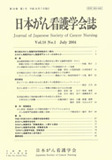Japanese
English
- 販売していません
- Abstract 文献概要
- 参考文献 Reference
要旨
本研究は,造血細胞移植を受ける患者が移植前から無菌室退室までの期間を心理的に安定して過ごすことにかかわる要因について縦断的に検証することを目的とし,第一部である本研究では無菌室入室前の移植への受容とそれにかかわる要因の関連性を検証した.
移植に対する現実的な認識と心理的安定度と定義した移植受容度,移植に対する脅威的な認識度(脅威度)および楽観度,対処方法,個人特性因子(心理特性,ソーシャル・サポートなど)といった要因の関連性についてパイロットスタディの結果に基づいて作成した自己開発質問紙,既存尺度ならびに診療記録よりデータ収集し,重回帰分析を用いて検討した.
対象は血液疾患治療のため7移植施設で初回移植を受ける43例とした.
この結果,脅威度が強いと移植受容度が低下し,脅威度と楽観度は負の相関にあったが,楽観度は移植受容度に関連が認められなかった.また心理特性としての楽観的思考傾向も脅威度を低めるが移植受容度には影響せず,楽観的思考は脅威を低減するが真の心理的安定や現実認識をもたらしていなかった.さらに脅威度は,移植前の医療者による情報的なサポートよりも情緒的なサポートを強化することによって低減可能であることが示された.以上の結果は移植を受ける患者に対して,心理的な安定を導くための看護援助方法を構築する際の重要な示唆となった.
The present study was conducted to longitudinally verify the factors associated with psychological stability in patients undergoing hematopoietic cell transplantation, from before transplantation until discharge from the laminar air flow(LAF)room. As the first stage of continuing research, we investigated psychological transplantation acceptance before entering the LAF room and identified related factors.
Data were collected using the existing scales, medical charts, and questionnaires, which were developed based on the results of a pilot study analyzing such factors as, transplantation acceptance(defined as recognition of the reality of undergoing transplantation and psychological stability),threatening recognition level(recognition of threatening associated with undergoing transplantation), optimistic level, coping, and individual factors(psychological traits, social support, medical condition and demographic data). A multiple regression analysis was performed to evaluate these data.
Subjects were 43 patients with hematological malignancies who underwent hematopoietic cell transplantation for the first time in one of the seven participating institutions.
The results indicated that : the stronger the threatening recognition, the lower the transplantation acceptance I there was a negative correlation between threatening recognition and optimistic level ; and there was no correlation between transplantation acceptance and optimistic level. Moreover, optimistic thinking, a psychological trait, reduced threatening recognition, but did not affect transplantation acceptance. While optimistic thinking reduced threatening recognition, it did not lead to psychological stability and reality recognition. Furthermore, the results suggest that emotional support provided by medical personnel before transplantation, rather than informational support, is effective in reducing threatening level. The above findings provide important suggestion for establishing nursing intervention to achieve psychological stability in patients undergoing hematopoietic cell transplantation.
Copyright © 2004, Japanese Society of Cancer Nursing All rights reserved.


